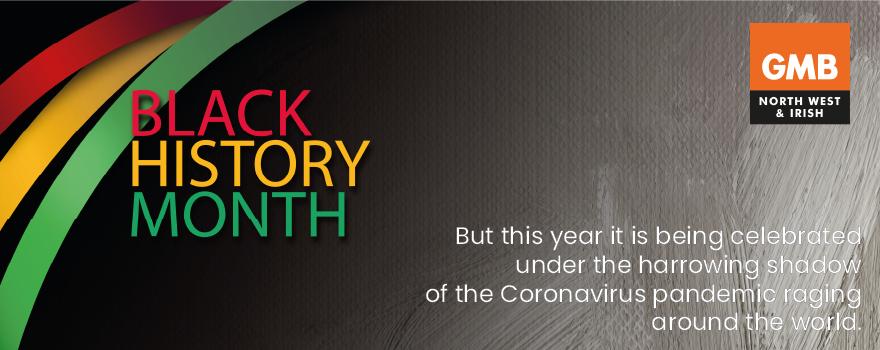
Research by University College London scientists found that people from black, Asian and minority ethnic communities in the UK are two to three times more likely to die from Coronavirus
How will a future Black History Month record the devastating impact of the Coronavirus pandemic on the BAME population?
October is Black History Month. But this year it is being celebrated under the harrowing shadow of the Coronavirus pandemic raging around the world.
It is the African and Asian continents recording some of the highest rates of infections and deaths. In Africa the five countries reporting most cases are South Africa, Morocco, Egypt, Ethiopia and Nigeria. In Asia, the five countries reporting most cases are India, Iran, Iraq, Bangladesh and Saudi Arabia.
And as we are all, quite naturally, concerned about a second wave of infections affecting our local streets and our own neighbourhoods; it is black and asian people who are suffering the brunt of this global pandemic, a fact that rarely appears on our news bulletins
And another fact rarely reported is that here in the United Kingdom, it is the BAME community that has been disproportionately affected by the virus.
Research by University College London scientists found that people from black, Asian and minority ethnic communities in the UK are two to three times more likely to die from Coronavirus , despite the fact that most minority groups are relatively younger overall compared to the white population. The Office of National Statistics reported that black people are four timesmore likely to die from the virus than white people. A third of people occupying critical care beds have been non white patients.
Asian and black people are six times more likely than the general population to have type two diabetes, putting them at a higher risk of serious health complications, according to Diabetes UK. Genetics and differences in lifestyles are believed to be the major cause of the increased risk. Complications arising from diabetes include cardiovascular disease and kidney damage. Diabetes and heart disease have been identified as being a significant risk in dying from the virus.
Vitamin D is essential for healthy immune systems to fight off infections and viruses. Dr David Grimes, a consultant physician in Blackburn, has undertaken 30 years of research into Vitamin D deficiency in the local BAME population. It takes six times longer for a dark skinned person to absorb sufficient levels of Vitamin D from sunlight than it does for a white person. Scientists have found that Vitamin D helps regulate the sometimes fatal inflammatory response caused by the virus.
One in five people working in the NHS in England is from an ethnic minority background yet two thirdsof NHS staff deaths attributed to Covid-19 were black or Asian. Minority ethnic staff are over-represented in public-facing, low pay jobs in hospitals and have greater exposure to infected patients (Healthcare assistants, porters, cleaners, etc.) The same is for public transport, the taxi industry and retail sector; which all have a significant number of BAME employees and who are at a greater risk of exposure to the virus.
Twice as many people from deprived communities have died from the virus. Government statistics show that people from ethnic minority groups are more likely than white British people to live in the most deprived 10% of neighbourhoods in England. In my home town of Rochdale, as in many parts of the country, Asian communities occupy areas of the poorest housing and live in the most overcrowded conditions and have least access to open spaces. Self isolation and effective social distancing is almost impossible in these circumstances. Long-term health inequalities and poor access to health services faced by Asian communities have also been a contributory factor in increased fatalities linked to the virus.
Issues with self isolation in larger households are likely to be a factor in the greater spread of COVID-19 among the minority ethnic population. The multi-generational occupancy of many BAME households has put older people at greater risk of contracting the virus.
The reasons for the higher death rate from Coronavius among the black and Asian community are obviously complex. However, the increased health risks among BAME people, combined with increased levels of deprivation, low-income occupations and poor housing conditions has proved to be a deadly cocktail for ethic minority communities.
Despite the government and its scientific advisors being aware of the significant risk faced by BAME workers who are over-represented in employment sectors and with an increased risk of exposure to COVID-19; such as health, public transport and retail industries; no specific measures were taken to shield them from exposure to the virus.
There has been a failure of the government to provide adequate public information about the higher risk posed by the virus to the BAME population. Indeed it has largely been left to minority communities themselves to disseminate critical information about keeping safe during the pandemic. I was so concerned about the delay in providing translations of essential advice; I personally distributed a bilingual leaflet in English and Urdu to my 8,000 constituents.
Inequalities are likely to continue beyond the immediate health crisis. The decision to cancel school exams and rely on predicted grades based on teacher assessments of past performance will have a negative impact on grades awarded to BAME students. Research has shown that BAME students frequently outperform grade scores predicted by their teachers. This will have a negative impact on future opportunities and social mobility for many young people from minority ethnic communities.
A decade of austerity cuts to public services has had a disproportionate impact on already deprived communities, of which the BAME population is a significant element. It has led to higher levels of unemployment and poverty, worsening housing conditions and poorer health. Access to public services has worsened and health inequality has become more deep-rooted.
The pandemic has exposed just how devastating these inequalities have been for the BAME community.
The Bank of England is already speculating on the level of public spending cuts that will be required to pay for the cost of fighting the COVID-19. We must not allow the poorest and most vulnerable in society to once again pay the heaviest price. As we have already seen, for many in our minority communities, they have already paid with their lives.
Hopefully, I will live long enough to see how in future Black History Month records just how this pandemic devastated the world's BAME population.
Faisal Rana - Trade Unionist and Labour Councillor


